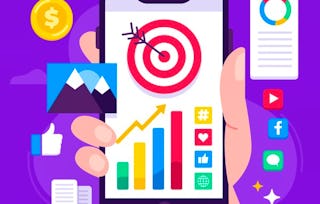Learner Outcomes: After taking this course, you will be able to:
- Utilize various Application Programming Interface (API) services to collect data from different social media sources such as YouTube, Twitter, and Flickr. - Process the collected data - primarily structured - using methods involving correlation, regression, and classification to derive insights about the sources and people who generated that data. - Analyze unstructured data - primarily textual comments - for sentiments expressed in them. - Use different tools for collecting, analyzing, and exploring social media data for research and development purposes. Sample Learner Story: Data analyst wanting to leverage social media data. Isabella is a Data Analyst working as a consultant for a multinational corporation. She has experience working with Web analysis tools as well as marketing data. She wants to now expand into social media arena, trying to leverage the vast amounts of data available through various social media channels. Specifically, she wants to see how their clients, partners, and competitors view their products/services and talk about them. She hopes to build a new workflow of data analytics that incorporates traditional data processing using Web and marketing tools, as well as newer methods of using social media data. Sample Job Roles requiring these skills: - Social Media Analyst - Web Analyst - Data Analyst - Marketing and Public Relations Final Project Deliverable/ Artifact: The course will have a series of small assignments or mini-projects that involve data collection, analysis, and presentation involving various social media sources using the techniques learned in the class. The course was developed by Dr. Chirag Shah while he was a faculty member at Rutgers University. He is currently a faculty member at University of Washington.















